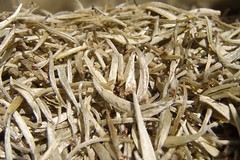
White Downy Silvery Needles
The lightest, least processed of all the true teas, white tea is made from leaves plucked while still young enough to be covered in silvery down, and steam-dried almost immediately. Its flavour is soft, mild and honey-like, although only slightly sweet; it has little of the astringency, and almost none of the bitterness, of green and darker teas. The infusion, too, is honey-yellow - only the unbrewed leaves are tinged with white hairs. Once brewed, there is little to distinguish the leaves from infused green tea leaves.
White tea is even richer in antioxidant polyphenols than green tea; the short time for which green tea leaves are withered, or the fact that they are typically plucked later in the season, seem to make a big difference to the amount of health-giving catechins available to the body.
White tea retains a reputation for extreme rarity, but as word has spread of its unique flavour and exceptional health properties, more and more suppliers have started selling what they describe as white tea. Some of this apparently increased availability is down to questionable selling practices - with 'White Monkey' green tea, for instance, being sold as white; there is certainly also more white tea being produced, though. A Chinese invention - originating, like oolong and lapsang souchong, from Fujian Province - white tea is now also produced in Japan, Darjeeling and Sri Lanka.
White tea is forgiving of a wide range of brewing techniques, being as it is so mild; I favour about a heaped teaspoonful per cup, brewed for something like three minutes, using water which is well shy of boiling point - around seventy or eighty degrees centigrade. You might find your own preferences vary.
Edinburgh's Chai Teahouse
ships
tea anywhere in the world
and has a range of three very nice white
teas at good prices.
'White
tea' can also be used to
refer to plain boiled water - 'silver
tea', as the Swedes call it - or to 'English
tea', which is to say black
tea with milk.
I wouldn't recommend it though, you'll only confuse people.